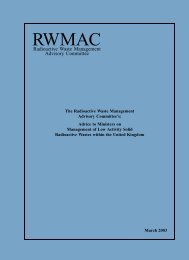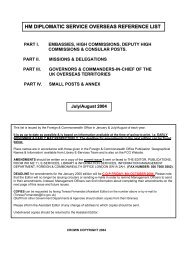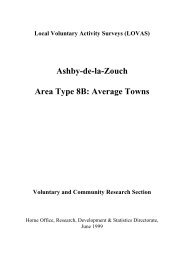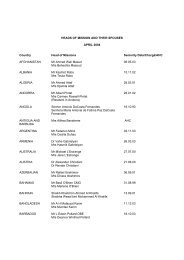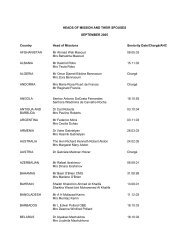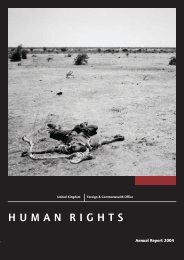A detailed guide to State Pensions for advisers and others
A detailed guide to State Pensions for advisers and others
A detailed guide to State Pensions for advisers and others
Create successful ePaper yourself
Turn your PDF publications into a flip-book with our unique Google optimized e-Paper software.
38<br />
Contracting out of the additional <strong>State</strong> Pension scheme<br />
Since 1978 it has been possible <strong>for</strong> employees <strong>to</strong> opt out of the additional <strong>State</strong><br />
Pension scheme. This is called ‘contracting out’ <strong>and</strong> means their additional<br />
<strong>State</strong> Pension will be reduced.<br />
The effect on the additional <strong>State</strong> Pension<br />
From 6 April 1978 <strong>to</strong> 5 April 1997 (SERPS)<br />
Any additional <strong>State</strong> Pension earned through SERPS from 6 April 1978 <strong>to</strong> 5 April 1997<br />
is reduced (which could be <strong>to</strong> a nil amount) if the person was contracted out at any<br />
time during this period.<br />
From 6 April 1997 until 5 April 2002 (SERPS)<br />
SERPS is not paid <strong>for</strong> any week a person was contracted out.<br />
From 6 April 2002 (<strong>State</strong> Second Pension)<br />
The <strong>State</strong> Second Pension is reduced (which could be <strong>to</strong> a nil amount) if a person<br />
is contracted out.<br />
If a husb<strong>and</strong>, wife or civil partner has died – inherited SERPS <strong>and</strong> inherited<br />
<strong>State</strong> Second Pension<br />
A person whose husb<strong>and</strong>, wife or civil partner has died may be able <strong>to</strong> inherit<br />
additional <strong>State</strong> Pension from their late husb<strong>and</strong>, wife or civil partner (known as<br />
the contribu<strong>to</strong>r). In some limited circumstances this may also apply where the late<br />
contribu<strong>to</strong>r had been contracted out of SERPS all their life. The surviving spouse or<br />
civil partner may inherit 50% of the <strong>State</strong> Second Pension. How much SERPS<br />
pension they may inherit depends on the date their late husb<strong>and</strong>, wife or civil<br />
partner reached (or would have reached) their <strong>State</strong> Pension age.<br />
If the person marries or <strong>for</strong>ms a new civil partnership be<strong>for</strong>e they reach their <strong>State</strong><br />
Pension age, they will no longer be able <strong>to</strong> rely on their late husb<strong>and</strong>, wife or late<br />
civil partner’s additional <strong>State</strong> Pension record.<br />
Inherited additional <strong>State</strong> Pension is paid by way of a Category B pension<br />
(see pages 44 <strong>to</strong> 49).<br />
In addition, if the deceased spouse or civil partner was contracted out, the<br />
inherited additional <strong>State</strong> Pension may be reduced <strong>to</strong> reflect this.<br />
Inherited SERPS<br />
When SERPS was introduced in 1978, a person could inherit up <strong>to</strong> 100% of their<br />
late husb<strong>and</strong>’s or wife’s entitlement. The Government changed the law in 1986 <strong>and</strong><br />
it was intended that if a husb<strong>and</strong> or wife died after 6 April 2000, the person would<br />
only be able <strong>to</strong> inherit up <strong>to</strong> 50% of their late husb<strong>and</strong>’s or wife’s entitlement.<br />
It became clear that <strong>for</strong> many years after 1986 some people were given incorrect<br />
or misleading in<strong>for</strong>mation about the change <strong>and</strong> may have planned <strong>for</strong> their<br />
future on that basis. As a result the Government introduced new rules that mean,<br />
there is a gradual reduction in the maximum percentage that someone may inherit.<br />
[SS (Inherited SERPS) Regs 2001]



